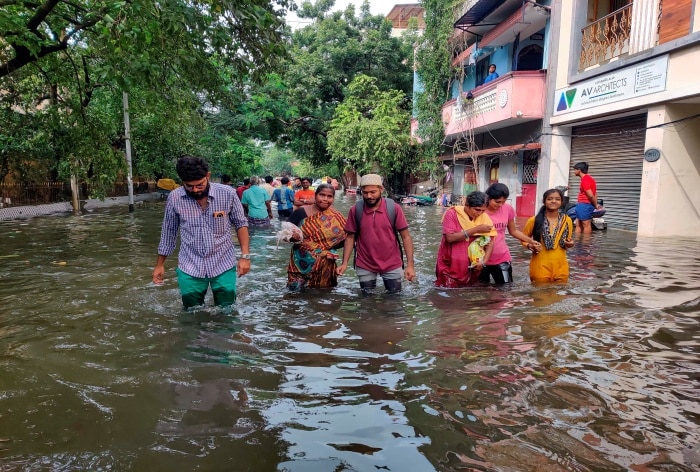Cyclone Michaung has disrupted the livelihood of thousands of people. Here are a few health risks that people should be careful about.
Cyclone Michaung: The severe cyclonic storm Michaung, which crossed the Andhra Pradesh coast close to Bapatla on Tuesday and subsequently weakened into a cyclonic storm, left a trail of destruction in its wake. Michaung is expected to subside into a deep depression over the next six hours, said an official. The storm damaged 770-kilometre roads, uprooted 35 trees and killed three livestock, among others.
According to data shared by the Chief Minister’s Office (CMO), nearly 40 lakh people from 194 villages and two towns were affected by Michaung’s impact, including the inundation of 25 villages.
Under the influence of the severe cyclonic storm, 10 places – seven in Tirupati and three in Nellore – experienced more than 200 mm rainfall on Tuesday. Manubolu in Nellore district recorded 366.5 mm rainfall.
With villages, cities, localities and apartments being heavily inundated, the health risks in flood-like situations increase manifolds. Monsoons entail host of bacteria, fungi, humid air and what not. With floods, there sewage water, contaminated water and everything becomes a mix and unfortunately many people have to wade through it to come to dry land. This may lead to several diseases.
Cyclone Michaung: 5 Health Diseases to Look Out For During Floods
- Respiratory infections: Exposure to damp and moldy environments in the aftermath of a flood can increase the risk of respiratory infections, including pneumonia, asthma, and bronchitis.
- Typhoid Fever: Typhoid is caused by a bacteria called Salmonella typhi. As the bacteria invade the body, it causes symptoms like sustained fever, headache, constipation, nausea etc. It may last about 14 days. Due to poor sanitation, it may be transported via contaminated food and water.
- Cholera: According to the definition by World Health Organisation, Cholera is an acute diarrhoeal infection caused by ingesting food or water contaminated with the bacterium Vibrio cholerae.It causes severe diarrhoea, vomiting.
- Mental health issues: The trauma of losing homes, belongings, and loved ones can lead to long-lasting mental health issues such as anxiety, depression, and post-traumatic stress disorder (PTSD).
- Malaria: Deadly infection can be caused by Plasmodium parasites. Fever, chills, sweat, nausea, body aches are initial symptoms. Malaria can last around 7-30 days depending on the severity of the disease.
- Dengue: Dengue is a viral infection caused due to a mosquito bite. High fever, pain behind eyes, and severe headache are few major symptoms of the fever. It may last for about a week.
- Yellow Fever: Caused by yellow fever virus also known as the flavivirus, a mosquito bite can lead to it. Fever, nausea, backache, abdominal pain etc are few major symptoms.
- Hypothermia: This is a very common occurrence in children and the elderly during flood-like situations. This health condition occurs when body loses heat quickly before it can produce more. It is when body temperature falls below 35 degree Celsius.
While it is difficult to maintain sanitisation during a crisis like this. it is always better to be aware , take necessary precautions and consult a health professional for proper advice.
–>
